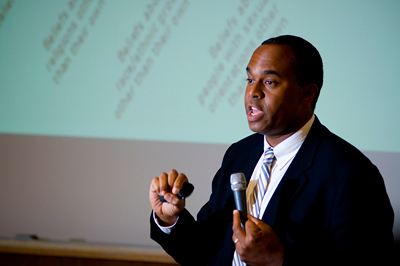Incoming freshman class more diverse, but achievement rates still lacking, says deputy provost
By Lauren Gold

Cornell's incoming freshman class will be the most racially and ethnically diverse "probably ever; certainly in last two decades," said David Harris, deputy provost and vice provost for the social sciences, to alumni in Malott Hall June 6.
Presenting the keynote address at the second annual Reunion Diversity Forum, sponsored by the Office of Minority Alumni Programs, Harris said that preliminary data show that the enrollment of African-American freshmen for the fall is up 56 percent from a year ago. The increase is due in part to better recruiting strategies and financial aid policies, he said.
But enrolling students from more diverse backgrounds is just one of four broad university goals, he noted. Equally important are "engagement" -- finding ways to enable individuals from different backgrounds to interact and learn from one another; "inclusiveness" -- creating a place where every member of the community feels at home; and "achievement" -- enabling individuals to achieve their full potential.
Overall, Cornell ranks high among peer schools in measures of engagement and inclusiveness, Harris said, citing 2006 surveys in which a large majority of graduating seniors reported that they questioned or reconsidered their views about race, religion, ethnicity or politics at Cornell; and that they would recommend Cornell to graduating seniors they consider similar to themselves.
But there is room for improvement, Harris said, especially when it comes to achievement rates of some minority groups.
"I believe that this is the one that's perhaps most important, and I think gets much less attention than it ought to," he said.
Graduation rates show small gaps between groups, with women graduating at a slightly higher rate than men, and white and Asian-American students at a slightly higher rate than black and Latino students. But breaking down the statistics into race-gender interactions and other measures of achievement, like the percentage of minority students making the dean's list, show more profound inequalities.
Shrinking those gaps is a priority, Harris said.
"We just started in the last few months to pull these numbers and to put a lot more emphasis on achievement diversity than we have in the past," he said.
And persistence is key, he said -- comparing the challenge of creating and maintaining diversity to the plight of the Sisyphus, the mythological Greek king charged with rolling a boulder up a hill for eternity.
"Every time he lets go, it rolls back down the hill. And that's diversity," Harris said. "When we don't keep the pressure on, we see our progress erode."
Harris cited a variety of initiatives across campus aimed at keeping the pressure applied, including the University Diversity Council, co-chaired by President David Skorton and Provost Kent Fuchs, which meets several times each semester; the Faculty Institute for Diversity, which guides faculty in making their courses resonate with a broader audience; and Day Hall Talks Diversity, an outreach effort by administrators to educate and engage students on diversity topics.
Changes in financial aid policies since 2008 have been a major success in making Cornell more accessible to the best students from diverse backgrounds, he added.
"The most important point here is that while we've been able to increasingly diversify the class, the quality hasn't declined at all," he said. "We had processes that worked a lot better, and financial aid policies that allowed us to get a lot of students who previously said, 'I can't afford to come here, even though I would like to.'
"We're really excited about it," Harris said. "We know that the work begins now; it doesn't end now. We have the kids in the door -- [now] we have to get them out …. with excellence."
Media Contact
Get Cornell news delivered right to your inbox.
Subscribe